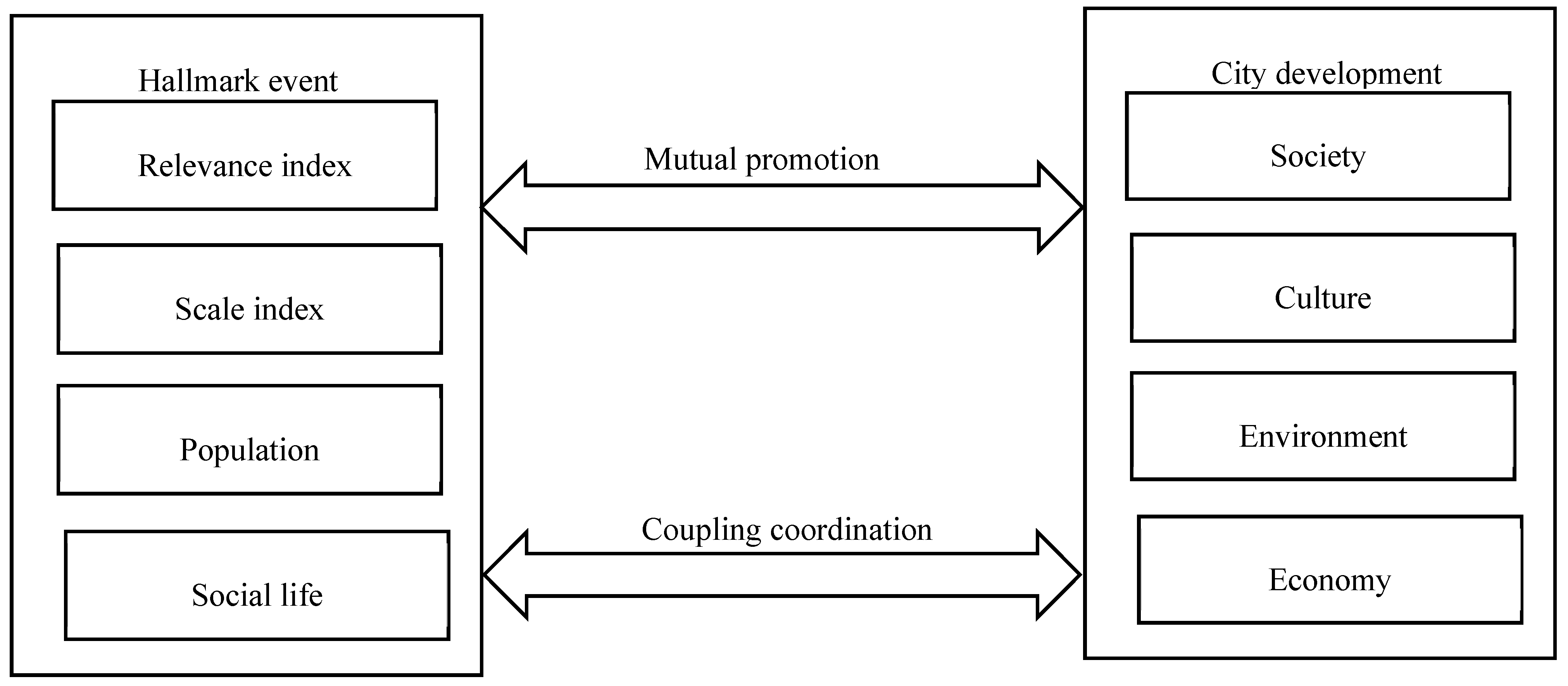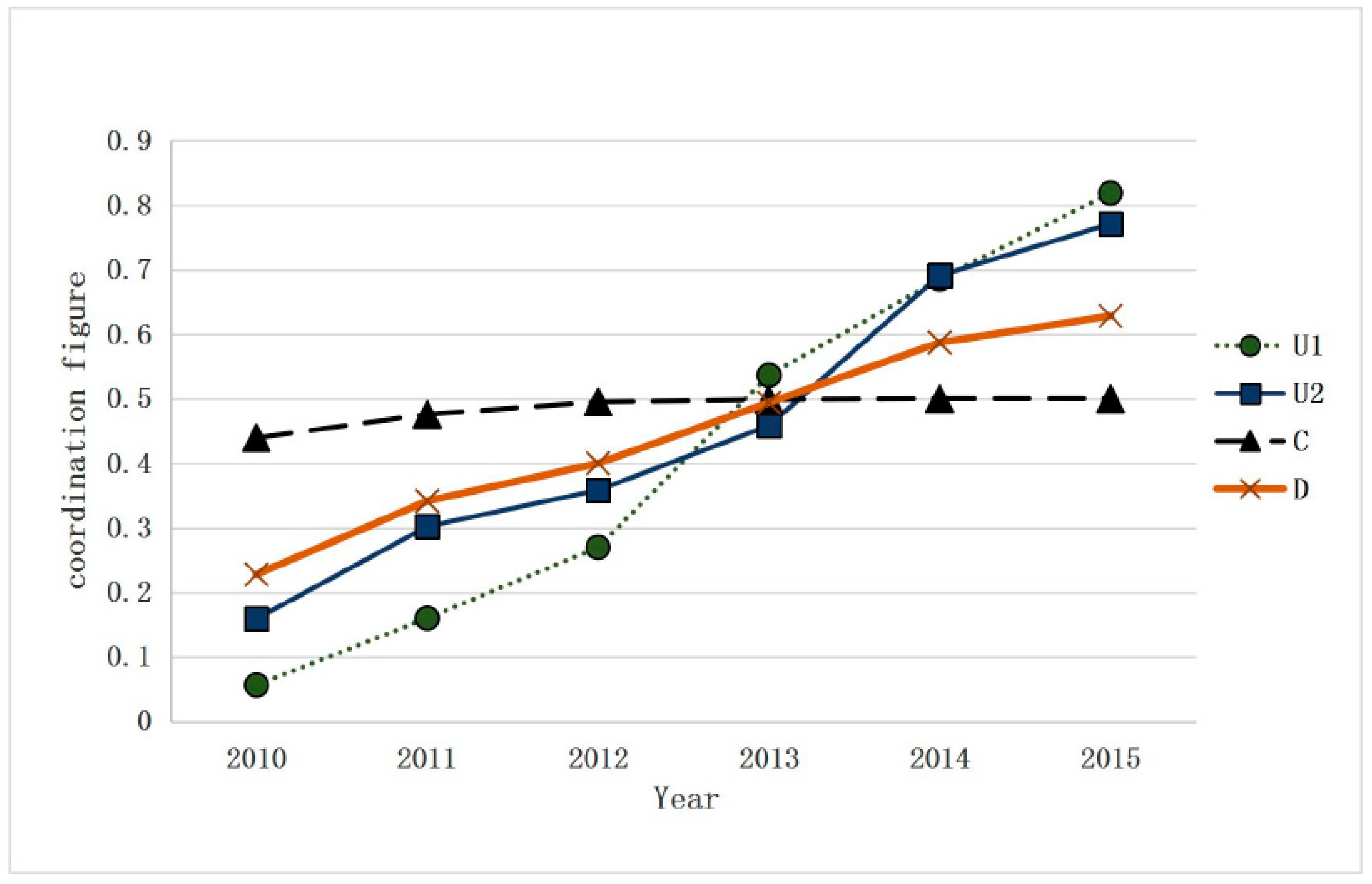Examining the Impacts of Mega-Events on Urban Development Using Coupling Analysis: A Case Study of the Boao Forum for Asia
Abstract
1. Introduction
2. Literature Review
2.1. Mode Coupling Theory
2.2. The Relationship between Mega-Events and Urban-Development
2.3. Evaluation Indicator System
2.3.1. Mega-Event Indicators
2.3.2. Urban Development Indicators
3. Methodology
3.1. Study Site and Context
3.2. Data Source and Data Preprocessing
3.3. Data Analysis
3.3.1. The Indices for the Evaluation of Mega-Events and City Development
3.3.2. Evaluation of the Mega-Event and City Development Index System Indicators
3.3.3. The Coupling Coordination Degree Model
4. Results
4.1. Analysis of the Mega-Event and Urban Development Index System
4.2. Coupling Analysis of Mega-Event Values and Urban Development
- (1)
- 2010–2012: In the initial stage, there is a general increasing trend of the coupling degree between a mega-event and city development. More specifically, the development level of the Boao Forum for Asia was lower than the level of the city development during this time. Studies have found that the processes of a mega-event and city development are not coordinated. In fact, mega-events and city development have a mutually adverse effect, and this may be why the Boao Forum for Asia event lags considerably behind urbanization.
- (2)
- 2013–2014: During these two years, the overall coupling degrees between the event and the city development remain at a higher level, showing cross-level change. Gradual improvement of the comprehensive event subsystem level and comprehensive city development subsystem level is achieved between these two years, and the coupling degree is more balanced and stable. The coupling degree transforms from the “slightly unbalanced” to the “nearly balanced” development stage and remains balanced.
- (3)
- 2014–2015: The city development of Qionghai experiences a remarkable period of rapid growth during this year and is barely balanced with a high coupling degree. Subsystems of events have recently undergone rapid growth, and, at the same time, city development subsystems have seen steady growth in the past two years. The “Primary balanced development” stage between the mega-event and city development begins in 2014, and, since then, the developmental trajectory of the mega-event and the city development have shown comprehensive coordination.
5. Discussion and Conclusions
5.1. Theoretical Implications
5.2. Managerial Implications
6. Limitations and Suggestions for Future Research
Author Contributions
Funding
Conflicts of Interest
References
- Barton, J.R.; Ramírez, M.I. The Role of Planning Policies in Promoting Urban Sprawl in Intermediate Cities: Evidence from Chile. Sustainability 2019, 11, 7165. [Google Scholar] [CrossRef]
- Bottero, M.; Caprioli, C.; Cotella, G.; Santangelo, M. Sustainable cities: A reflection on potentialities and limits based on existing eco-districts in Europe. Sustainability 2019, 11, 5794. [Google Scholar] [CrossRef]
- Koodsela, W.; Dong, H.; Sukpatch, K. A Holistic Conceptual Framework into Practice-Based on Urban Tourism toward Sustainable Development in Thailand. Sustainability 2019, 11, 7152. [Google Scholar] [CrossRef]
- Matheson, V. Economic Multipliers and Mega-event Analysis; Working Paper Series; 04-02; College of the Holy Cross: Worcester, MA, USA, 2004. [Google Scholar]
- Ingram, M.D.; Roling, B. The concept of matrix-mediated coupling: A new interpretation of mixed-cation effects in glass. J. Phys. Condens. Matter 2003, 15, S1595. [Google Scholar] [CrossRef]
- Zhang, B. Coupling Research Based on City Brand Effects of Large Sports Events and Urban Development. Rev. Fac. Ing. 2017, 32. [Google Scholar]
- Liu, Y.B.; Li, R.D.; Song, X.F. Analysis of coupling degrees of urbanization and ecological environment in China. J. Nat. Resour. 2005, 1. [Google Scholar]
- Wang, Y.M.; Ma, Y.F. Analysis of coupling coordination between urban tourism economy and transport system development—A case study of Xi′an city. J. Shaanxi Norm. Univ. (Nat. Sci. Ed.) 2011, 1, 22. [Google Scholar]
- Liu, Y.; Li, R.; Song, X. Grey associative analysis of regional urbanization and eco-environment coupling in China. Acta Geogr. Sin. 2005, 2, 237–247. [Google Scholar]
- Malecki, E. Jockeying for position: What it means and why it matters to regional development policy when places compete. Reg. Stud. 2004, 38, 1101–1120. [Google Scholar] [CrossRef]
- Maennig, W.; Du Plessis, S. Sport stadia, sporting events and urban development: International experience and the ambitions of Durban. In Urban Forum; Springer: Dordrecht, The Netherlands, 2009; Volume 20, pp. 61–76. [Google Scholar]
- Fourie, J.; Santana-Gallego, M. The Impact of Mega-events on Tourist Arrivals; Working Paper Number 171; Stellenbosch University: Stellenbosch, South Africa, 2010. [Google Scholar]
- Jones, C. Mega-events and host-region impacts: Determining the true worth of the 1999 Rugby World Cup. Int. J. Tour. Res. 2001, 3, 241–251. [Google Scholar] [CrossRef]
- Absalyamov, T. The influence of cultural and sport mega-events on sustainable development of the city. Procedia-Social Behav. Sci. 2015, 188, 197–201. [Google Scholar] [CrossRef]
- Ren, X. Aspirational Urbanism from Beijing to Rio de Janeiro: Olympic Cities in the Global South and Contradictions. J. Urban Aff. 2017, 39, 894–908. [Google Scholar] [CrossRef]
- Shin, H.B.; Li, B. Whose games? The costs of being “Olympic citizens” in Beijing. Environ. Urban. 2013, 25, 559–576. [Google Scholar] [CrossRef]
- Boykoff, J. Celebration Capitalism and the Olympic Games; Routledge: London, UK, 2013. [Google Scholar]
- Brent Ritchie, J.R. Assessing the impact of hallmark events: Conceptual and research issues. J. Travel Res. 1984, 23, 2–11. [Google Scholar] [CrossRef]
- Taek Lim, S.; Sil Lee, J. Host population perceptions of the impact of mega-events. Asia Pac. J. Tour. Res. 2006, 11, 407–421. [Google Scholar] [CrossRef]
- Gursoy, D.; Kendall, K.W. Hosting mega events: Modeling locals’ support. Ann. Tour. Res. 2006, 33, 603–623. [Google Scholar] [CrossRef]
- Lamberti, L.; Noci, G.; Guo, J.; Zhu, S. Mega-events as drivers of community participation in developing countries: The case of Shanghai World Expo. Tour. Manag. 2011, 32, 1474–1483. [Google Scholar] [CrossRef]
- Pappas, N. Hosting mega events: Londoners’ support of the 2012 Olympics. J. Hosp. Tour. Manag. 2014, 21, 10–17. [Google Scholar] [CrossRef]
- Richards, G.; Wilson, J. The impact of cultural events on city image: Rotterdam, cultural capital of Europe 2001. Urban Stud. 2004, 41, 1931–1951. [Google Scholar] [CrossRef]
- Bandi Tanner, M.; Künzi, A.; Lehmann Friedli, T.; Müller, H. Event performance index: A holistic valuation tool. Int. J. Event Festiv. Manag. 2018, 9, 166–182. [Google Scholar] [CrossRef]
- Li, Y.; Li, Y.; Zhou, Y.; Shi, Y.; Zhu, X. Investigation of a coupling model of coordination between urbanization and the environment. J. Environ. Manag. 2012, 98, 127–133. [Google Scholar] [CrossRef] [PubMed]
- Ding, L.; Zhao, W.; Huang, Y.; Cheng, S.; Liu, C. Research on the coupling coordination relationship between urbanization and the air environment: A case study of the area of Wuhan. Atmosphere 2015, 6, 1539–1558. [Google Scholar] [CrossRef]
- He, J.; Wang, S.; Liu, Y.; Ma, H.; Liu, Q. Examining the relationship between urbanization and the eco-environment using a coupling analysis: Case study of Shanghai, China. Ecol. Indic. 2017, 77, 185–193. [Google Scholar] [CrossRef]
- Müller, M. What makes an event a mega-event? Definitions and sizes. Leis. Stud. 2015, 34, 627–642. [Google Scholar] [CrossRef]
- Sanders, H.T. Building the convention city: Politics, finance, and public investment in urban America. J. Urban Aff. 1992, 14, 135–159. [Google Scholar] [CrossRef]
- Smith, A. Leveraging benefits from major events: Maximising opportunities for peripheral urban areas. Manag. Leis. 2010, 15, 161–180. [Google Scholar] [CrossRef]
- Talavera, A.M.; Al-Ghamdi, S.G.; Koç, M. Sustainability in Mega-Events: Beyond Qatar. Sustainability 2019, 11, 6407. [Google Scholar] [CrossRef]
- Yang, Z. Sustainability of Urban Development with Population Decline in Different Policy Scenarios: A Case Study of Northeast China. Sustainability 2019, 11, 6442. [Google Scholar] [CrossRef]


| Serial Number | Coordination Degree Interval | Coordination Level |
|---|---|---|
| 1 | 0–0.1 | Extreme imbalance |
| 2 | 0.001–0.2 | Serious imbalance |
| 3 | 0.2001–0.3 | Moderate imbalance |
| 4 | 0.3001–0.4 | Mild imbalance |
| 5 | 0.4001–0.5 | Nearly imbalance |
| 6 | 0.5001–0.6 | Barely coordination |
| 7 | 0.6001–0.7 | Primary coordination |
| 8 | 0.7001–0.8 | Intermediate coordinate |
| Year | U1 (BFA) | U2 (The Development of Qionghai) | C | D | Evaluation |
|---|---|---|---|---|---|
| 2010 | 0.0562 | 0.159 | 0.4393 | 0.2276 | Moderate imbalance |
| 2011 | 0.1598 | 0.302 | 0.4757 | 0.3415 | Mild imbalance |
| 2012 | 0.2697 | 0.3583 | 0.495 | 0.3998 | Nearly imbalance |
| 2013 | 0.5363 | 0.4582 | 0.4985 | 0.4939 | Nearly imbalance |
| 2014 | 0.6855 | 0.6911 | 0.5 | 0.5869 | Barely coordination |
| 2015 | 0.8188 | 0.7707 | 0.4998 | 0.6283 | Primary coordination |
| Items | First Class Indexes | Weight | Second Class Indexes | Weight | Type |
|---|---|---|---|---|---|
| Mega-mark event | Scale index | 0.1649 | Total Investment in Fixed Assets | 0.4694 | + |
| Fixed assets as a percentage of GDP | 0.5306 | + | |||
| Relevance index | 0.3658 | Tourism Income | 0.2695 | + | |
| Number of visitors | 0.3424 | + | |||
| Real estate investment | 0.168 | + | |||
| The proportion of tertiary industry in GDP | 0.2201 | + | |||
| Population | 0.2326 | the number of employees in tertiary industry | 0.284 | + | |
| Newly employed population | 0.2618 | + | |||
| Population urbanization rate | 0.4542 | + | |||
| Social life | 0.2367 | road area per citizen/m2 | 0.3017 | + | |
| Added value for transportation, storage and postal services | 0.3467 | + | |||
| total retail sales of consumer goods | 0.3516 | + | |||
| urban development | Economy | 0.2953 | GDP of a city | 0.1668 | + |
| local financial revenue | 0.2314 | + | |||
| The proportion of secondary industry in GDP | 0.4386 | − | |||
| Per capita disposable income of urban households | 0.1631 | + | |||
| Culture | 0.2348 | urban population density | 0.5534 | − | |
| quantity of employment | 0.2314 | + | |||
| Education expenditure | 0.2152 | + | |||
| Society | 0.2264 | Freight Turnover | 0.229 | + | |
| Total annual import and export volume | 0.1924 | + | |||
| The number of overseas visitors received | 0.3727 | + | |||
| Per capita park size | 0.2059 | + | |||
| Environment | 0.2435 | GDP energy consumption | 0.2432 | − | |
| Afforestation coverage in the city | 0.2959 | + | |||
| Environmental governance expenditure | 0.4609 | + |
© 2020 by the authors. Licensee MDPI, Basel, Switzerland. This article is an open access article distributed under the terms and conditions of the Creative Commons Attribution (CC BY) license (http://creativecommons.org/licenses/by/4.0/).
Share and Cite
He, B.; Zhu, L.; Cai, X.; Li, J.; Zhu, H. Examining the Impacts of Mega-Events on Urban Development Using Coupling Analysis: A Case Study of the Boao Forum for Asia. Sustainability 2020, 12, 730. https://doi.org/10.3390/su12020730
He B, Zhu L, Cai X, Li J, Zhu H. Examining the Impacts of Mega-Events on Urban Development Using Coupling Analysis: A Case Study of the Boao Forum for Asia. Sustainability. 2020; 12(2):730. https://doi.org/10.3390/su12020730
Chicago/Turabian StyleHe, Biao, Lianxin Zhu, Xiaomei Cai, Jun (Justin) Li, and Hong Zhu. 2020. "Examining the Impacts of Mega-Events on Urban Development Using Coupling Analysis: A Case Study of the Boao Forum for Asia" Sustainability 12, no. 2: 730. https://doi.org/10.3390/su12020730
APA StyleHe, B., Zhu, L., Cai, X., Li, J., & Zhu, H. (2020). Examining the Impacts of Mega-Events on Urban Development Using Coupling Analysis: A Case Study of the Boao Forum for Asia. Sustainability, 12(2), 730. https://doi.org/10.3390/su12020730



_Li.png)

